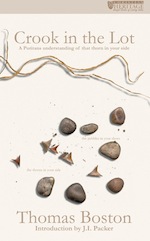 “Crook in the Lot: A Puritan’s Understanding of that Thorn in Your Side” by Thomas Boston (edited by Roger N. McDermott and published by Christian Focus Publications, 2002). Reviewed and recommended by Pastor McShaffrey.
“Crook in the Lot: A Puritan’s Understanding of that Thorn in Your Side” by Thomas Boston (edited by Roger N. McDermott and published by Christian Focus Publications, 2002). Reviewed and recommended by Pastor McShaffrey.
The human condition has not changed much over the past two hundred and fifty years. There is still suffering, pain, affliction, deformity, and various imperfections with which all men must deal. Though we have done our best as a society to minimize or even deny such, this fierce reality remains unchanged.
The modern western mindset has been built upon a fanciful delusion. Modernists seem to assume that they are entitled to a pain-free life. Comfort and ease have been elevated in the modern mind to the status of certain and inalienable rights to which all have a claim.
While our society has tried desperately to meet the expectations of modern man; all its striving has been in vain. All of its convenience stores, fast food, plastic surgery, and other various opportunities for escapism can do nothing to erase the reality of pain.
Though Thomas Boston lived and died over two centuries ago, he is a man with whom modernists have much in common. He knew pain. He knew suffering. His family was stricken with disease and depression.
Nevertheless, Mr. Boston had something that most modern men do not: A High Priest who could sympathize with his weaknesses.
Mr. Boston had placed his full trust and faith in Jesus Christ and this enabled him not only to make sense of his pain, but also to thank God for it.
To give thanks to God for pain may sound like pure madness to you. To say that affliction comes from God may sound equally absurd. Nevertheless, this demonstrates no fault in Boston’s thinking. It only proves how much we have lost in the way of understanding. It only proves how much hope we have forfeited. It only proves how much we need to read this book.
First, we are grateful to the editor for including so extensive a prologue by J.I. Packer. In this introduction, Packer not only convinces the reader of this book’s modern relevance, but also orients the modern reader to the puritan mindset and doctrinal framework.
This was most necessary since reading and appreciating the writings of Mr. Boston assumes a level of Christian knowledge and maturity that was more common in his day than it is in ours.
Mr. Boston first published this book in 1737 under the title “The Crook in the Lot: The Sovereignty and Wisdom of God in the Afflictions of Men Displayed” and this title explains both the purpose of Boston and the content of the book.
Mr. Boston’s desire was to teach, equip, and encourage those to whom he preached (much of the material came from his sermons).
His first priority was to lead the unconverted to Christ for this was (and still is) the only answer to man’s greatest need and his second priority was to help Christians make sense of their many imperfections and afflictions. This he accomplishes in six chapters.
The first chapter addresses “The Sovereignty and Wisdom of God in Man’s Affliction.” Here Boston convinces the reader that whatever crook one finds in their lot (discontenting or uncomfortable aspect of one’s life) is of God’s making. As such, it is impossible for man to mend that which God has been pleased to mar. Therefore, we must first consider the crook in our lives as God’s good work so that we come to behave properly under it.
The second chapter is “An Encouragement to Christian Duty.” After convincing the reader again that the crook is God’s work and is, therefore, not able to be mended, Boston calls the reader to respond to it as a Christian. Some of these duties include: submit to it, go as quietly under it as possible, be satisfied with it, have a complacency in it, and rest in it and the God who sent it.
The third chapter illustrates that “God Blesses his People Through Affliction.” Boston here shows us how to sprinkle our “crook” with gospel grace that we might come to recognize and humble ourselves under the perfect wisdom and good works of God.
The fourth and fifth chapters revisit and further explain our responsibility as Christians. Mr. Boston here calls us to humble ourselves under the mighty hand of God. He convinces the reader first of “The Duty of Man in Affliction” and then provides practical “Directions for Reaching this Humiliation.”
The final chapter is entitled: “God Uplifts His People in Affliction.” Mr. Boston here illustrates the unshakable hope that is to be found in the nature, power, goodness, wisdom, and providence of God. He vigorously points the reader to the doctrines and promises of God’s Word that they might not despair. The lifting up of the humble will not be long delayed! Therefore, Boston concludes:
“Let not then the humble cast away their confidence, whatever their humbling circumstances be; let them assure themselves there will come a lifting up to them at length; if not here, yet to be sure hereafter” (p. 195).
The modern Christian must avail himself of the rich heritage and wisdom that God was pleased to grant to his church in times past, for in the writings of the puritans is presently hid a great depth of understanding and piety without which we would certainly be impoverished.
Thomas Boston’s Crook in the Lot is a fine example of how the faithful saints of old comprehended, cherished, and applied the rich promises of God which are always, “Yes and amen” in Christ Jesus our Lord.
